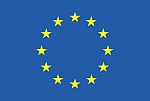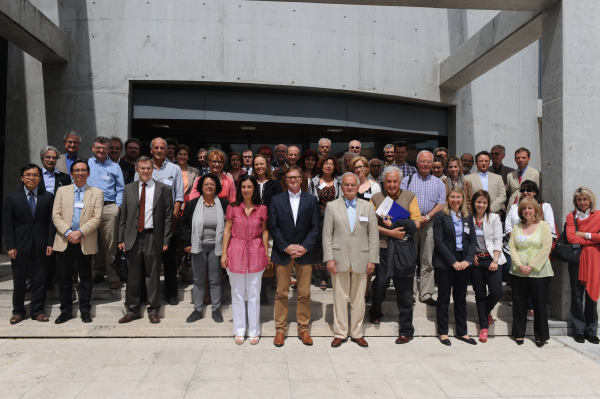short menu
About EUREC
National Information
Services
- Event Calendar
- Information for Researchers
- Training Materials
- Login for EUREC members

This network has received funding from the European Union.
EURECNET - EURECNET Project Meetings
EURECNET
Meetings
2013/08/15
EURECNET Conference in Lisbon
Research in Neurosciences.
Scientific, ethical and legal challenges for review by Research Ethics Committees
On the 20th and 21th of June 2013 the EURECNET members met in Lisbon for a conference on "Research in Neurosciences. Scientific, ethical and legal challenges for review by Research Ethics Committees”. The meeting has been hosted by Professor Maria Alexandra Ribeiro from the National Ethics Committee for Clinical Research.
The conference identified Research in Neurosciences as a new challenging issue for the review by REC. Advances in neurosciences bring new options that go behind medical use for diagnosis and treatment. Deep brain stimulation is associated with side effects or complications such as changes in the psychological, social or affective behaviour and neuroimaging brings ethical dilemmas regarding for instance incidental findings, namely if, how and when to disclose information to the patients. Some other major concerns were discussed such as the possibility of intervening in mind with the new psychopharmacs and nanodrugs and also how to deal with patients unable to give consent, particularly in neurodegenerative disorders such as Alzheimer, Parkinson or Huntington diseases.
For the conference there were invited scientific experts to present their own work and to discuss strategies and difficulties in performing research studies with humans. The conference begun with an open lecture, The Neuroscience of Ethics and Ethics of Neuroscience, as a starting point for discussion. Research in different areas of the neurosciences was discussed by experts within law and ethics, and also by the participants of the meeting.
The conference was attended by EURECNET members and invited experts as well as by some members of the Research Ethics Committees in Portugal.

2012/11/23
EURECNET Conference in Oslo
Whole Genome Sequencing.
Scientific, ethical and legal challenges for review by Research Ethics Committees
On the 6th and 7th of September 2012 the EURECNET members met in the vicinity of Oslo for a conference on "Whole genome sequencing. Scientific, ethical and legal challenges for review by research ethics committees". The meeting has been hosted by Professor Knut Ruyter from the Regional Committees for Medical Research Ethic, University of Oslo.
The conference identified whole genome sequencing as a new challenging issue for the review by REC. The technology is by now affordable and is proposed used in a number of projects, not only in clinical research, but especially in biobank and epidemiology research. It confronts REC with the challenge of deciding projects in which the research terrain doesn't always fit the map, especially when it comes to multi-national projects and international cooperation within large infrastructures.
The conference invited scientific experts to present status quo of the technology, as well as concrete projects based on national and international cooperation. The use of whole genome sequencing was discussed by experts within law and ethics. In addition an expert in social science presented results of the Eurobarometer regarding public perceptions and attitudes to genetic research, and by extension to whole genome sequencing.
The conference distinguished between clinical research and biobank research and epidemiology.
The conference also introduced Shared ethical debate, which has been used in the UK as a mean to improve the quality of the decision process in REC. The model was introduced by the ethics advisor, Dr. Hugh Davis, of the National Research Ethics Services in the UK. Concrete research projects dealing with whole genome sequencing were presented by two investigators and discussed in groups. Davis moderated the plenary sessions.
On the part of the European Commission Domian Karatzas has attended the conference. In his capacity as Head of the Ethics Sector (DG Research and Innovation) he presented the expectations of the EC Ethics Reviews under the FP7 Ethics Framework and the special clauses on ethics in research.
Karatzas advocated rules for submission of proposals and the related evaluation as well as selection and award procedures. Karatzas reported that, at present, the most common shortcommings of proposals in terms of ethics include the following:
- Lack of consistency between the research work proposed and the ethics annex of the application
- No information on handling incidental findings
- Issues related to children: failure to describe if child obtains a real and direct benefit. If child is not directly benefited, a minimum risk and minimum burden must be illustrated
- Developing Countries: failure to describe why it is necessary to include developing countries and whether any benefits will reach these countries and the local populations
- Clinical trials: failure to justify human intervention from an ethical perspective, safeguard data protection, design of informed consent forms
- Data protection and privacy: codification, storage and anonymizaton of personal data
Agenda (PDF)
Presentations (PDF):
- Consolidated WGS and new legal challenges for RECs
- Distinctions genetic research and clinical genetic services
- Does WGS raise new ethical callenges for REC
- Expectations of the EC Ethics Review
- Public perception and attitudes towards DNS sequencing
- Screening cancer patient genomes for mutations and germ line variations
- The ShED Learning from each other's review
- The system of REC in Slovakia
- Understanding the science and technogoly of WGS 1
- Understanding the science and technology of WGS 2
2012/11/23
EURECNET Conference in Bratislava
Challenges of Multicenter Studies in Europe
On the 12th and 13th of April 2012 the EURECNET members met for a conference on "Ethical and Legal Challenges of Multicenter Studies in Europe". The meeting has been hosted by Professor Jozef Glasa from the Slovak Institute of Medical Ethics and Bioethics.
To extend the perspective of Research Ethics Committees two experts were invited: Dr. Hartmut Krafft from the Unit Clinical Trials at the Paul-Ehrlich-Institute in Germany represented the perspective of the Competent Authorities and Fabio d'Atri, officer from the Unit Medicinal Products represented the perspective of the European Commission. Furthermore, four new EURECNET partners from Bulgaria, the Czech Republic, Latvia and Romania introduced themselves by informing about the situation in their countries. As an example of multicenter studies Marcella Rietschel (Central Institute of Mental Health of the University of Mannheim, Germany) presented the "IMAGEN Study". IMAGEN is a European Research Project on risk taking behavior in teenagers, which aims to identify biological and environmental factors that might have an influence on mental health of minors in different European Countries.
The main questions of the meeting included what strategies could be used to make scientists more committed to ethical issues and how ethical review could deal with different legal frameworks and legal traditions in various European countries. It is obvious that centralized states act differently than federally organized states and hence it is problematic to call for "a single vote for Europe". But is it ethically acceptable to treat people differently due to regional differences? Considering the different traditions, the most important challenge is to foster the exchange of knowledge and experience of RECs all over Europe – and also between RECs and the competent authorities. All attendees summarized it as one important task for EURECNET to implement a procedural framework for Ethical Review similar to the voluntary harmonization process (VHP) initiated by the competent authorities. Ethics Committees could still decide locally, but at least the 27 member states would have a majority vote. Safeguarding the rights of people and protecting human subjects in clinical trials has to be the overall objective of all parties concerned.
Agenda (PDF)
Presentations (PDF):
2011/07/13
Kick-Off Meeting
On March 1st 2011 the Kick-Off Meeting of EURECNET project has taken place at the conference centre of the Rheinisches Landesmuseum in Bonn. The main objective of the meeting was to bring together all project partners in order to provide them with information about the aspects of the different working packages and to discuss the further proceeding and strategic considerations necessary in order to set up EURECNET as a permanent platform for the networking of Research Ethics Committees (RECs) in Europe. After a welcome and general introduction to the Kick-Off-Meeting by the Coordinator of the EUREC Project, Dr. Dirk Lanzerath, DRZE; Dr. Lino Paula from the European Commission gave an overview on the project's history and aims, touching upon historical key concepts and milestones of research ethics committees (RECs), the need for European exchange, and hence for the EURECNET Project. Their presentations were followed by presentations by Professor Dr. Elmar Doppelfeld (Permanent Working Party of Research Ethics Committees in Germany, Cologne), Professor David Townend (Care and Public Health Research Institute, Maastricht), Professor Dr. Dominique Sprumont (Université Neuchâtel - Institut de droit de la santé, Neuchâtel), Dr. Michael Bone (The Association of Research Ethics Committees Sunderland, Newcastle), Professor Dr. Eugenijus Gefenas (The Lithuanian Bioethics Committee, Vilnius) and Professor Dr. Knut Ruyter (National Committee for Medical and Health Care Research Ethics, Oslo) who are the leaders of the five main working packages of the EUREC Project.
<- Home
